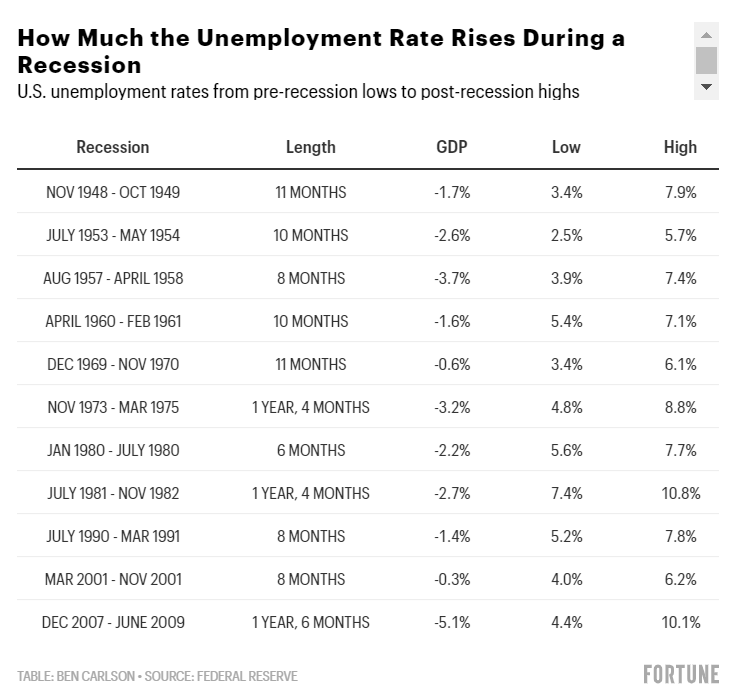新冠疫情将引发经济衰退,这个趋势变得越来越明显。全球供应链中断,旅游业遭遇重创,会议和其他大型活动纷纷取消,甚至职业体育赛事和高校体育活动也被推迟或取消。
股市暴跌,现在较史上高点下跌了25%,而且虽然以往的经济数据喜人,但很快这些数据就会跳崖式下降。所以现在是时候着手为经济衰退做准备了。
我们如何把个人事务安排妥当,迎接令人痛苦的经济衰退呢?本文提供了以下建议:
控制生活方式通胀
当经济和市场运转良好的时候,我们往往会放任生活方式通胀发生。但在经济衰退时期,应该评估自己的消费方式,了解可以削减哪些不必要的消费预算。在经济衰退期间最好的生存方式之一是合理精简消费习惯。
信用卡债务绝不是好主意,因为信用卡利息极高,而且在经济衰退期间信用卡债务可能会急速增加直至失控。如果你无力偿还欠款,现在是一次很好的机会,你可以给信用卡公司打电话,协商更低的利息,或者确定更合理的还款计划。只要你提出要求,许多信用卡公司都会愿意让步。
另外,你还可以给有线电视公司、电话公司和保险公司打电话,为自己争取最合适的费率。许多公司会跟你协商一个更优惠的方案。你这样做最糟糕的结果也不过是被拒绝而已。
保证充足的流动性
全球股市普遍下跌。许多投资者多年来一直在等待股价下跌,如今他们的愿望终于实现了。面对这种局面,只有两种方式可以加以利用:
(1)资产配置。配置足够多的流动资产,可以让你调整好状态,迎接经济衰退。最简单的做法是选择优质债券或现金。
(2)足够高的储蓄率。高储蓄率有许多好处。当金融资产价格暴跌时,你可以利用储蓄的资金以更低的价格买进,而且足够多的存款还能缓解个人财务受到的冲击。
对于有些人而言,流动性能够保证无论是自己的投资组合还是个人财务,都能承受经济衰退的洗礼。个人理财专家经常鼓吹在安全应急储蓄工具中存入6-12个月支出的好处。如果没有应急资金,也应该有替代方案以防万一,比如房屋净值信贷额度、零利率信用卡、经纪账户或Roth IRA缴费等。
虽然我们希望你的个人应急计划永远没有用武之地,但它确实可以让你在需要的时候避免恐慌。
按揭贷款再融资
假如一年前你申请了一笔35万美元固定利率住房抵押贷款,贷款期限30年,你的贷款利率约为4.5%左右,相当于月供约1775美元(不考虑税费和保险费)。
今天30年固定利率住房抵押贷款的利率接近3.3%。同样35万美元的贷款,月供只有约1530美元,每个月可以节省240美元。在经济衰退时期,这笔额外的资金可以作为缓冲。股市崩溃的一个好处是,利率下降降低了借款成本。
经济衰退与每个人息息相关
下表显示了自二战以来每次经济衰退期间美国的失业率上升趋势:

从衰退前的低点到衰退后的高点,平均失业增长率为3.2%。这意味着当前的失业率将从3.6%上升到6.8%。目前美国的劳动人口约为1.6亿人,相当于会有500多万人失业。
显而易见,每次经济衰退都是不同的,而这一次经济衰退必定会带来独一无二的风险和挑战。但重要的是要记住,经济衰退不能只看经济数据。有些人会比别人受到更大的伤害。
有句名言说得好:“当你的邻居失业时就是经济衰退,当你自己失业时就是经济萧条。”
无论你是否会失业,现在都应该为下一次经济下行做好财务上的准备。(财富中文网)
本文作者本·卡尔森是一位注册金融分析师,现任里萨兹财富管理公司(Ritholtz Wealth Management)机构资产管理部门总监。卡尔森可能持有本文中所讨论的证券或资产。
译者:Biz
新冠疫情将引发经济衰退,这个趋势变得越来越明显。全球供应链中断,旅游业遭遇重创,会议和其他大型活动纷纷取消,甚至职业体育赛事和高校体育活动也被推迟或取消。
股市暴跌,现在较史上高点下跌了25%,而且虽然以往的经济数据喜人,但很快这些数据就会跳崖式下降。所以现在是时候着手为经济衰退做准备了。
我们如何把个人事务安排妥当,迎接令人痛苦的经济衰退呢?本文提供了以下建议:
控制生活方式通胀
当经济和市场运转良好的时候,我们往往会放任生活方式通胀发生。但在经济衰退时期,应该评估自己的消费方式,了解可以削减哪些不必要的消费预算。在经济衰退期间最好的生存方式之一是合理精简消费习惯。
信用卡债务绝不是好主意,因为信用卡利息极高,而且在经济衰退期间信用卡债务可能会急速增加直至失控。如果你无力偿还欠款,现在是一次很好的机会,你可以给信用卡公司打电话,协商更低的利息,或者确定更合理的还款计划。只要你提出要求,许多信用卡公司都会愿意让步。
另外,你还可以给有线电视公司、电话公司和保险公司打电话,为自己争取最合适的费率。许多公司会跟你协商一个更优惠的方案。你这样做最糟糕的结果也不过是被拒绝而已。
保证充足的流动性
全球股市普遍下跌。许多投资者多年来一直在等待股价下跌,如今他们的愿望终于实现了。面对这种局面,只有两种方式可以加以利用:
(1)资产配置。配置足够多的流动资产,可以让你调整好状态,迎接经济衰退。最简单的做法是选择优质债券或现金。
(2)足够高的储蓄率。高储蓄率有许多好处。当金融资产价格暴跌时,你可以利用储蓄的资金以更低的价格买进,而且足够多的存款还能缓解个人财务受到的冲击。
对于有些人而言,流动性能够保证无论是自己的投资组合还是个人财务,都能承受经济衰退的洗礼。个人理财专家经常鼓吹在安全应急储蓄工具中存入6-12个月支出的好处。如果没有应急资金,也应该有替代方案以防万一,比如房屋净值信贷额度、零利率信用卡、经纪账户或Roth IRA缴费等。
虽然我们希望你的个人应急计划永远没有用武之地,但它确实可以让你在需要的时候避免恐慌。
按揭贷款再融资
假如一年前你申请了一笔35万美元固定利率住房抵押贷款,贷款期限30年,你的贷款利率约为4.5%左右,相当于月供约1775美元(不考虑税费和保险费)。
今天30年固定利率住房抵押贷款的利率接近3.3%。同样35万美元的贷款,月供只有约1530美元,每个月可以节省240美元。在经济衰退时期,这笔额外的资金可以作为缓冲。股市崩溃的一个好处是,利率下降降低了借款成本。
经济衰退与每个人息息相关
下表显示了自二战以来每次经济衰退期间美国的失业率上升趋势:
从衰退前的低点到衰退后的高点,平均失业增长率为3.2%。这意味着当前的失业率将从3.6%上升到6.8%。目前美国的劳动人口约为1.6亿人,相当于会有500多万人失业。
显而易见,每次经济衰退都是不同的,而这一次经济衰退必定会带来独一无二的风险和挑战。但重要的是要记住,经济衰退不能只看经济数据。有些人会比别人受到更大的伤害。
有句名言说得好:“当你的邻居失业时就是经济衰退,当你自己失业时就是经济萧条。”
无论你是否会失业,现在都应该为下一次经济下行做好财务上的准备。(财富中文网)
本文作者本·卡尔森是一位注册金融分析师,现任里萨兹财富管理公司(Ritholtz Wealth Management)机构资产管理部门总监。卡尔森可能持有本文中所讨论的证券或资产。
译者:Biz
It's increasingly becoming apparent that the outbreak of the coronavirus is going to cause an economic slowdown. Global supply chains are being disrupted. The travel industry is taking a nosedive. Conferences and other large events are being canceled left and right. Even pro and college sporting events are being postponed or called off.
The stock market is getting pummeled, now down 25% from all-time highs and while past economic data looks great, those numbers are quickly going to fall off a cliff. It's time to start preparing for a recession.
Here are some ways to get your affairs in order as we approach what is likely to be a painful economic slowdown:
Get your lifestyle inflation in check
When the economy and markets are humming along it becomes tempting to let lifestyle inflation get away from you. Now is the time to review your spending to understand which non-essential areas of your budget can be cut in case of a slowdown. One of the best ways to survive an economic downturn is by right-sizing your spending habits.
Credit card debt is never a good idea because the rates are so astronomically high but it can spiral out of control during an economic contraction. If you hold a balance and have trouble paying it off, now is a good time to call your credit card company to negotiate lower rates or figure out a more reasonable pay-off plan. Many of these companies will work with you if you ask.
It's also worth putting in a phone call to your cable, phone and insurance providers to ensure you're getting the best rates. Many of the companies will negotiate with you for better rates. And the worst they can do is say no if you ask.
Make sure you have enough liquidity
Stock markets around the globe are down across the board. Many investors have been waiting years for lower prices. Well, they're finally here. There are only two ways of taking advantage of this situation:
(1) Asset allocation. Have an asset allocation in place with enough liquid assets to allow you to rebalance into the pain. The simplest options here are high-quality bonds or cash.
(2) A high enough savings rate. A high savings rate is beneficial in a number of different ways. It not only gives you the option to buy financial assets at lower prices as they are in freefall but also offers a cushion when it comes to your finances.
And for some, liquidity is not just about ensuring their investment portfolio can withstand a storm, but their personal finances. Personal finance experts often preach the benefits of holding 6-12 months of expenses in a safe emergency savings vehicle. Those who don't have an emergency fund in place need to shore up alternatives just in case. This could be a home equity line of credit, zero interest rate credit cards, brokerage accounts or even Roth IRA contributions.
Hopefully your own personal emergency plan never gets triggered but it makes sense to have one in place to avoid panicking if it does.
Refinance your mortgage
If you took out a $350,000 mortgage a year ago from today you likely locked in a 30 year fixed rate mortgage at around 4.5%. That equates to a monthly payment of roughly $1,775 (ignoring taxes and insurance).
Today 30 year fixed-rate mortgages are closer to 3.3%. On that same $350,000 mortgage, that works out to a monthly payment of around $1,530, a savings of $240 a month. That extra money can provide a cushion during a potential economic slowdown. The one bright spot from the crashing stock market is interest rates have made borrowing more affordable.
Recessions are personal
The following table shows the increase in the U.S. unemployment rate during each recession since WWII:
The average rise from the pre-recession low to the post-recession high is 3.2%. That would take us from the current rate of 3.6% up to 6.8%. In a labor force of roughly 160 million people, that would be more than 5 million people out of a job.
Obviously every recession is different and this one will surely pose its own unique sets of risks and challenges. But it's important to remember that recessions go beyond economic data. Some people are hurt much worse than others.
There's an old saying that "It's a recession when your neighbor loses their job but a depression when you lose your own."
Whether you lose your job or not, now is the time to prepare financially for the next downturn.
Ben Carlson, CFA is the Director of Institutional Asset Management at Ritholtz Wealth Management. He may own securities or assets discussed in this piece.






